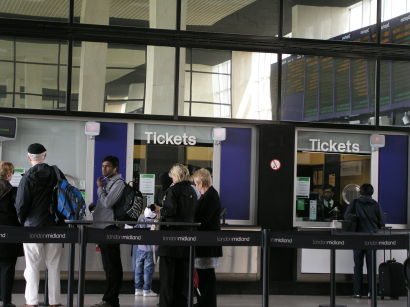PUBLIC PROTESTS have been taking place today over the New Year rises in rail fares, which ATOC has put at an average of 5.9 per cent.
This figure includes all fares, but some regulated fares are rising more steeply as operators take advantage of the 'flex' which allows them to increase some fares by as much as another 5 per cent, so long as others are kept down to maintain the average.
The fares changed yesterday, but today is the first working day on which many commuters will be faced with a higher bill, particularly if they renew their annual season ticket in early January.
The Prime Minister was personally blamed for the higher fares today when he was depicted on placards as The Fat Controller from the Thomas the Tank engine series at a protest in London.
Members of the TSSA carried the placards as commuters arrived at St Pancras International on their first day back at work after the Christmas break.
The TSSA said its protest was part of a coalition of transport and green groups who are opposed to fare rises, and the larger increases which are still apparently planned by the government over the next two years.
Although regulated fares are rising by an average of 6 per cent this week, it was to have been 8 per cent until the Chancellor made £290 million available to keep fares down in his Autumn Spending Statement. This meant that the rise could be maintained at RPI + 1 per cent, rather than rising by RPI + 3 per cent as had been planned for the three years starting with 2012. But no statement has been made about the rises which may be expected in the next two years. TSSA general secretary Manuel Cortes said: "This is just the start of three years of real pain for all passengers."
Watchdog Passenger Focus is also unhappy about the increases. Passenger Focus chief executive Anthony Smith, said: "Passengers will have to dig deep in their pockets to cover the six per cent and more fare rises coming into effect. Whatever the weather, these rail fare rises will make for a frosty return to work."
Mr Smith also sounded a warning note over the industry's costs. He added: "2011 saw the industry’s inefficiencies highlighted in a number of reports. The current policy of moving costs from the taxpayer on to the fare payer will go totally sour if the whole industry and government does not wring better value for money out of its spending – why should passengers go on paying for a fractured inefficient industry?"
The Campaign for Better Transport, meanwhile, urged commuters to tweet or text their protests about fare increases to the Treasury or directly to the Chancellor, George Osborne.
The Campaign claimed that commuters in Italy were paying only 10 per cent of the equivalent British fares, and that although French rail travel was the second most expensive in the European Union, after Britain, even there fares were only a third or less.
The Association of Train Operating Companies, whose members had to revise thousands of fares for a second time during December after the extra subsidy had been announced by the Chancellor at the end of November, said the additional revenue would be invested in the industry.
ATOC's chief executive Michael Roberts said: "The long-standing government approach to sustaining rail investment is to cut the contribution from taxpayers and increase the share paid for by passengers.
"The industry is working together to continue cutting costs as a way to help limit future fare rises and offer better value for money for taxpayers over the longer term."


